These Vegan Lemon Cupcakes are full of zesty lemon flavour, with a light fluffy sponge and smooth lemon buttercream. They are dairy free and egg free, and they can easily be made gluten free too if required. These vegan cupcakes are so simple to make with basic ingredients and equipment. If you've never made anything vegan before, make sure to read all my tips below before you start baking to help you get the best results!
This post may contain affiliate links. I earn from qualifying purchases.

Ingredient Tips & Equipment Information
- I used oat milk for the cupcakes, but you can use any plant milk that you prefer.
- I've found that the best dairy free butter for vegan buttercream is Flora Plant. Stork Baking Block is also very good. Using a block dairy free butter is much better for the buttercream. A margarine or spread style dairy free butter will make the buttercream too loose. I sometimes like to replace 25% of the vegan butter with some vegan shortening, but this is optional.
- You can use a different type of oil besides vegetable oil. I'd recommend one that doesn't have a strong flavour, canola and sunflower oil would both work well.
- For the best flavour, make sure to use a good quality lemon extract and not an essence. I like to use the brands Nielsen Massey or Steenbergs.
- You do need to add the vinegar to this recipe to get a good rise - it reacts with the baking powder to create air bubbles. Cider vinegar is the best vinegar to use, but white vinegar would be a suitable replacement. Balsamic or malt vinegar (the kind you put on your chips) will not work. And don't worry - you can't taste the vinegar in the cupcake!
- Although I provide cup measurements, I highly recommend weighing your ingredients out using digital kitchen scales. It is the most accurate way to measure ingredients and will ensure the best results. Digital scales are very low cost and can be purchased for around £12 ($16.50) .
- For teaspoon (tsp) and tablespoon (tbsp) measurements, please use measuring spoons and not the type of spoons you eat with. Again this will ensure accuracy and provide the best results.
For the full recipe with measurements, head to the recipe card at the end of this post.
How to make Vegan Lemon Cupcakes
In a mixing bowl, stir together self raising flour, caster sugar, baking powder and lemon zest. In a second mixing bowl or a large jug, whisk together vegetable oil, dairy free milk and cider vinegar
Pour the wet ingredients into the dry ingredients and whisk them together until combined and smooth. It's best to do this by hand with a whisk to avoid over mixing. Then divide the mixture between cupcake cases, I prefer to use a jug to do this as it is quite a wet mixture.
Bake for 20-25 minutes, or until risen and lightly golden, and a skewer inserted in the centre comes out clean. To make the buttercream, mix the dairy free butter, icing sugar, lemon extract and dairy free milk together until smooth. Pipe or spread on the cupcakes and decorate with lemon zest.
For the full recipe with measurements, head to the recipe card at the end of this post.

What is the best dairy free butter to use for the buttercream?
My favourite dairy free butter to use for vegan buttercream is Flora Plant. The Stork baking block is great too (the one wrapped in foil is vegan, not the tub as that contains milk). Block style dairy free butters give the vegan buttercream and better texture. Using a spread or margarine style dairy free butter will make the buttercream much looser. If you only have a spread or margarine style dairy free butter, you don't need to add as much or any plant milk to the buttercream.
How can you decorate the vegan lemon cupcakes?
I decorated them simply with some lemon zest. Other options include lemon sweets, white chocolate curls, fresh fruit or sprinkle. If using sprinkles and serving these cupcakes to vegans, make sure to check the sprinkles are vegan. Many sprinkles use animal products for colour, and confectioners glaze is a common ingredient in sprinkles that is not vegan because it comes from insects.
Who are the cupcakes suitable for?
These cupcakes are dairy free and egg free, they are also suitable for vegans. They can also be easily adapted to be gluten free.
Can this recipe be made gluten free?
Yes, you can replace the self raising flour with a gluten free self raising flour blend. If you only have a gluten free plain flour blend, you will need to add additional baking powder. The general advice is to add 2 tsp baking powder per 200g flour. You may also like to add ¼ tsp xanthan gum for better texture.

How long do the cupcakes last and can they be frozen?
The cupcakes will last for 3 days in an airtight container in a cool place. You can freeze both the cupcakes and the buttercream. To freeze them separately, wrap the cupcakes well in cling film or put them in an airtight container. The buttercream can be frozen in a sealed tub. To freeze them decorated, freeze the cupcakes on a plate until frozen solid, then carefully wrap in cling film. Remove the clingfilm when you take the cupcakes out of the freezer to defrost, as if they defrost with it still on it could damage the buttercream.
Can you make the cupcakes with plain/all purpose flour?
Self raising flour, which is very commonly used in the UK where I am based, already contains a raising agent and a little salt too. Therefore if you want to swap it for plain or all purpose flour, you will need to add some additional baking powder and also a little salt if you like. Some people like to add salt to cupcake recipes and some don't, so I'll leave that up to you as it won't affect the bake. The general advice is to add 2 teaspoons baking powder (a measuring teaspoon, not the kind you stir your coffee with) per every 200g plain or all purpose flour. Please note, I have not tested this recipe using plain or all purpose flour.
Do you need an electric mixer to make this recipe?
I actually never use an electric mixer to make the cupcake part of this recipe as it's so quick and easy to do by hand. The dry ingredients and wet ingredients can be quickly combined with a hand whisk, and it is better to do it this way to avoid over mixing. If you are using an electric mixer, keep it on a low speed and only mix for a short time. I do recommend using an electric mixer to make the buttercream if you can, but if you don't have one you can make it by hand too.
More tips for making the Vegan Lemon Cupcakes:
- Always pour the wet ingredients into the dry ingredients when making these cupcakes. It is the best way to avoid a lumpy batter.
- To pipe the buttercream onto the cupcakes, I used a Wilton 2D piping nozzle.
- I really do recommend using lemon extract for the buttercream, lemon juice is not as concentrated in flavour and you won't get the same lemony zing from it. You can find lemon extract in most supermarkets, I've bought it in Tesco before, and you can buy it online via Amazon.
- You could add even more lemon flavour to these cupcakes by scooping out the middle and filling them with vegan lemon curd!

Troubleshooting
My number one tip for getting the best results is to read through this whole page of tips and recommendations before starting, and follow the recipe exactly. If you have any questions about this recipe, or if something went wrong and you need help, please use the comment form below and I will get back to you. You can also get in touch with me on my Twitter, Instagram or Facebook. I'd love to hear from you!
Recommended equipment & ingredients*
- Mixing bowls
- Cupcake tin
- Measuring spoons
- Cooling rack
- Kitchen scales
- Electric hand mixer
- Piping bags
- Wilton 2D Piping nozzle
- Lemon extract
- Zester
- Yellow cupcake cases
*I earn a small amount of money if you buy the products after clicking on the links. You will not be charged anything extra for this. Thank you for supporting The Baking Explorer!

More vegan recipes...
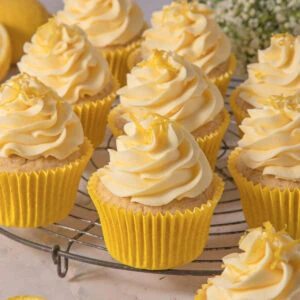
Vegan Lemon Cupcakes
Ingredients
For the cupcakes
- 250 g Self raising flour
- 150 g Caster sugar
- 1 tsp Baking powder
- 2 Lemons zest only
- 225 ml Dairy free milk I used oat milk
- 75 ml Vegetable oil
- 1 tsp Cider vinegar
For the buttercream
- 200 g Dairy free butter I used Flora Plant unsalted, softened
- 400 g Icing sugar
- 2 tsp Lemon extract
- 1-2 tbsp Dairy free milk I used oat milk
Instructions
- Pre-heat your oven to 160C Fan/350F/Gas Mark 4, and line a 12 hole cupcake tin with cupcake cases
- In a mixing bowl, stir together the caster sugar, self raising flour, baking powder and lemon zest
- In another mixing bowl, or a large jug, whisk together the vegetable oil, milk and cider vinegar
- Make a well in the centre of the flour mixture, and pour in the oil and milk mixture, whisk them together gently with a hand whisk until smooth
- Divide the mixture between the 12 cupcake cases. I find it easier to put the mixture into a jug or piping bag to do this as it's quite a wet batter
- Bake them for 20-25 minutes or until they are risen and a skewer inserted in the centre of the cupcakes comes out clean. Leave to cool completely on a cooling rack
- Make the buttercream by mixing the dairy free spread on it's own for a few minutes. Then add the icing sugar, dairy free milk and lemon extract, and mix until smooth. You can do this by hand or for best results use an electric mixer. If the buttercream is too stiff, you can add more dairy free milk
- Spread or pipe the buttercream on top of the cupcakes, and decorate with lemon zest
- Store in an airtight container in a cool place and eat within 3 days
Notes
- I used oat milk for the cupcakes, but you can use any plant milk that you prefer.
- I've found that the best dairy free butter for vegan buttercream is Flora Plant. Stork Baking Block is also very good. Using a block dairy free butter is much better for the buttercream. A margarine or spread style dairy free butter will make the buttercream too loose. I sometimes like to replace 25% of the vegan butter with some vegan shortening, but this is optional.
- You can use a different type of oil besides vegetable oil. I'd recommend one that doesn't have a strong flavour, canola and sunflower oil would both work well.
- For the best flavour, make sure to use a good quality lemon extract and not an essence. I like to use the brands Nielsen Massey or Steenbergs.
- You do need to add the vinegar to this recipe to get a good rise - it reacts with the baking powder to create air bubbles. Cider vinegar is the best vinegar to use, but white vinegar would be a suitable replacement. Balsamic or malt vinegar (the kind you put on your chips) will not work. And don't worry - you can't taste the vinegar in the cupcake!
- Although I provide cup measurements, I highly recommend weighing your ingredients out using digital kitchen scales. It is the most accurate way to measure ingredients and will ensure the best results. Digital scales are very low cost and can be purchased for around £12 ($16.50) .
- For teaspoon (tsp) and tablespoon (tbsp) measurements, please use measuring spoons and not the type of spoons you eat with. Again this will ensure accuracy and provide the best results.
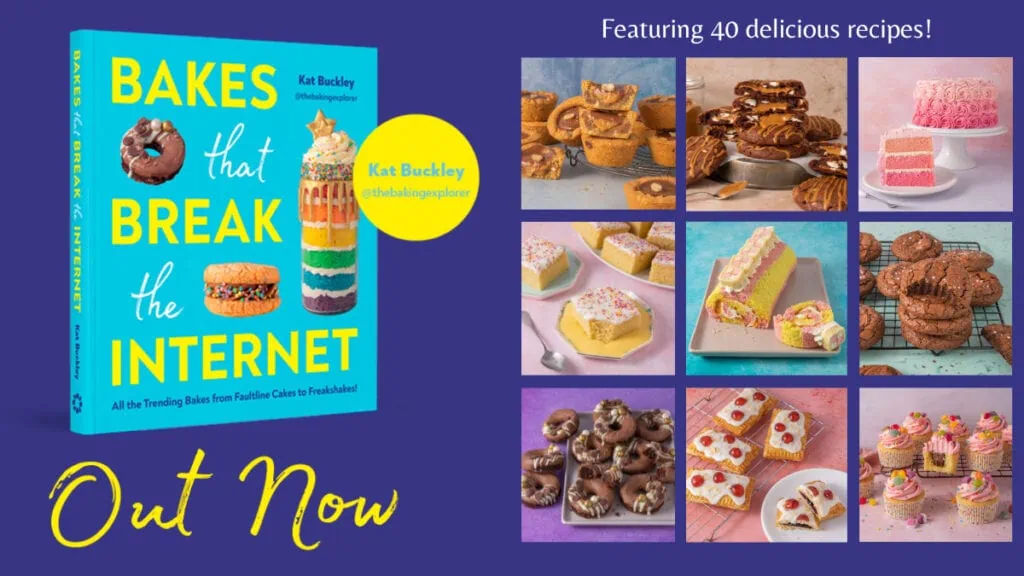

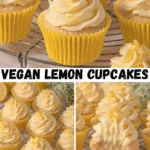






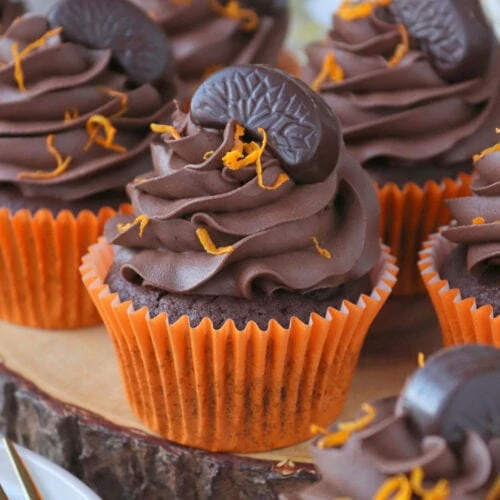
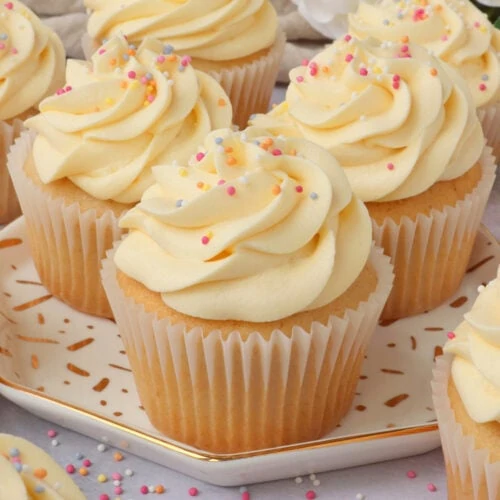
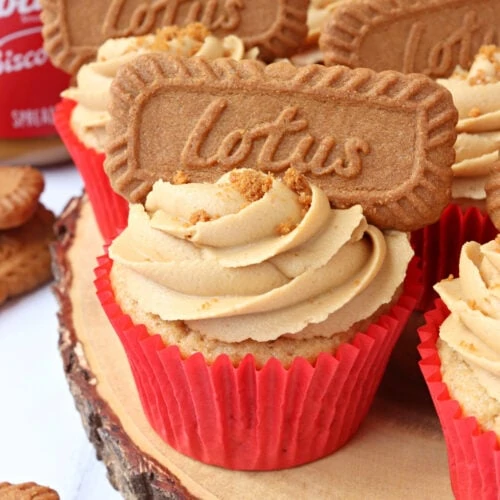
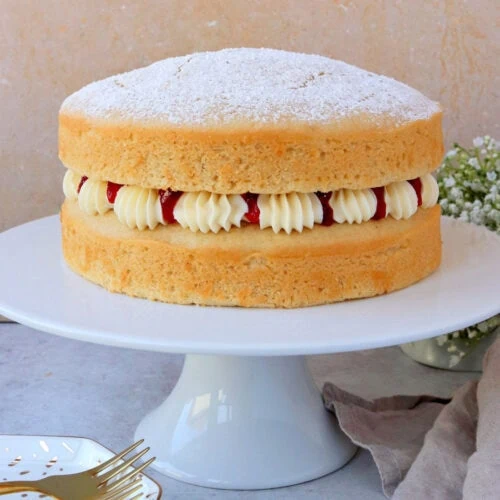
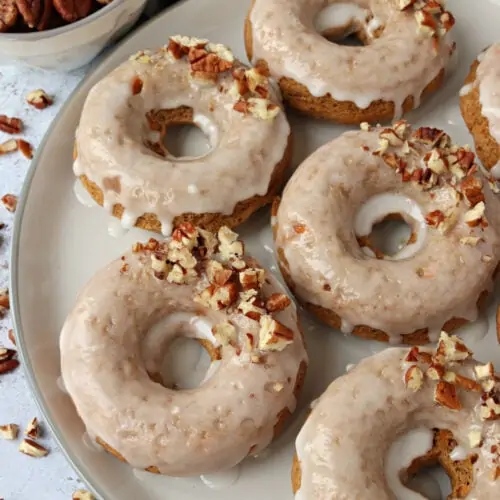
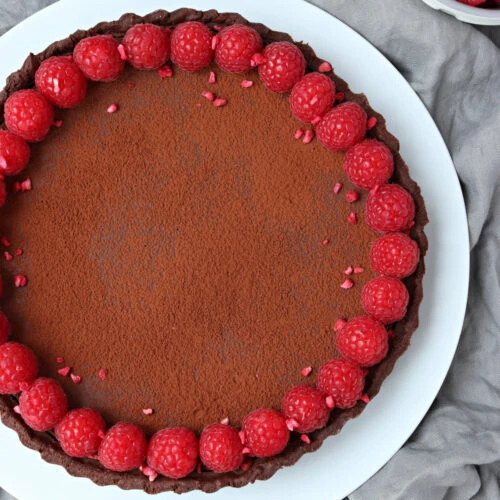
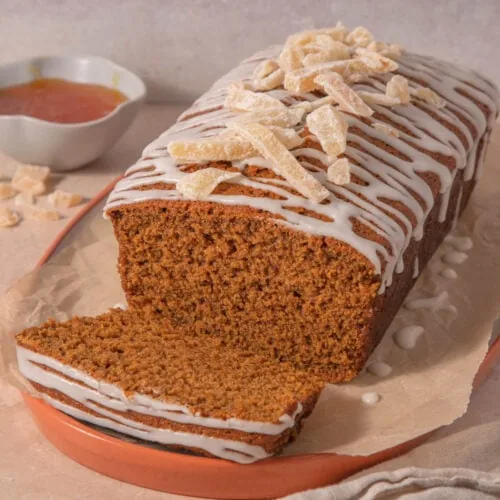
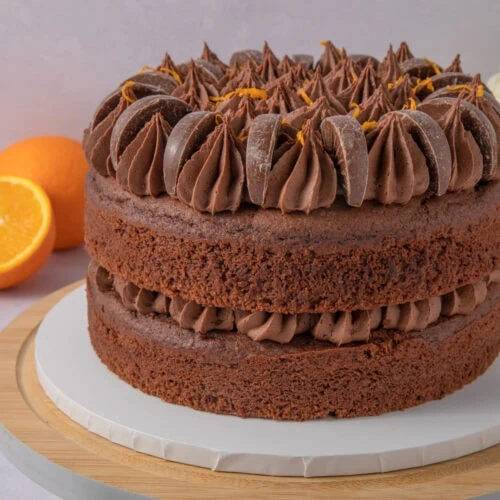
Leave a review & recipe rating